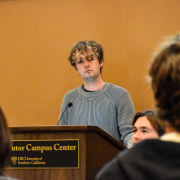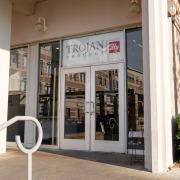On Thursday afternoon, President Carol Folt sent out a communitywide email with the early findings from the 2024 USC Culture Survey that over 15,000 students, faculty and staff filled out in January and February.
Of the one in four Trojans who took the survey, the highest-rated survey question consisted of 83% of respondents indicating that they felt “USC provides resources for mental health and well-being support,” while the lowest-rated of the nine survey questions consisted of 55% of respondents indicating they felt they could “raise concerns [at USC] without fear of retaliation.” The second-lowest rated survey question consisted of 57% of respondents indicating they felt “University Leadership actively listens and solicits dialogue.”
Daily headlines, sent straight to your inbox.
Subscribe to our newsletter to keep up with the latest at and around USC.
Five years ago, students, faculty and staff participated in a poll to define the University’s six “Unifying Values” as “Excellence; Integrity; Diversity, Equity and Inclusion; Well-Being; Open Communication; and Accountability.” At the start of the spring semester, the University invited the community to participate in a follow-up USC Culture Survey meant to “indicate the degree to which they [saw] each of [the University’s] Unifying Values in action” on campus.
The early findings from the survey revealed that respondents rated USC the highest in “Excellence” and the lowest in “Open Communication” and “Accountability.”
Devin Griffiths, an associate professor of English and comparative literature, participated in discussing, defining and promoting the University’s six Unifying Values as Dornsife Faculty Council president in 2019. Griffiths said that, after seeing the administration’s reaction to students participating in the “Gaza Solidarity Occupation” in Alumni Park, he felt there has “been a real sense that the University has not been living up to the values that we identified.”
Griffiths said he felt the University was specifically falling short of demonstrating accountability.
“I think this administration, like the administration before, has very much struggled to communicate clearly and to show accountability when they feel like they made an error,” Griffiths said. “I think the errors made around the valedictorian’s commencement address are a great example. I haven’t heard anybody from the administration apologize for how they handled that.”
Harlow Raye, a senior majoring in sociology and the co-founder of the USC chapter of Jewish Voice for Peace, said that they did not feel they could “raise concerns without fear of retaliation” knowing that many of their friends had “been arrested, been suspended [and] been targeted” for their participation in the pro-Palestinian encampment.
Griffiths said he also felt faculty were afraid of retaliation from the University.
“I think it’s absolutely true that there are many faculty who worry that if they speak out over issues they feel passionate about, that there will be consequences for them down the line,” Griffiths said. “That said, there’s a lot of really brave faculty … who have been very forthright and engaged in challenging the administration and serving in our Faculty Senate.”
Raye said they did not feel that the University was a place that “actively listens and solicits dialogue.”
“Putting a sign of, ‘This is a free speech area’ hidden behind a bush is just ridiculous. That’s not free speech.” Raye said. “[The] administration made it very clear that they are not in support of us truly fighting for what we believe in, that we should not raise concerns if our concerns don’t align with the interests of the college — specifically the economic interests of the college.”
When Raye tried to contact the administration directly in May to express their concerns about the University’s investments, they said they were also “completely ignored.”
Raye said they were frustrated by the lack of opportunities for students to speak to the University leadership and wanted to see administrators make more of an effort to speak with students.
“There’s [a] very clear hierarchy, and there is no real relationship between students and administration, and for that reason, there is a very strong disconnect between how we feel and how we are being perceived by administration,” Raye said. “There is no real way to create an alliance, to create a relationship, to create a sense of understanding and safety.”
Griffiths said he felt the University needed to “take really positive measures over the summer” to speak with and listen to students.
“I think it’s really clear that, unless the administration changes course around free speech on campus [and] how to respond in a forward way to student concerns and learns how to actually practice open, two-way communication, that we’re going to come back in the fall and we’re going to end up right back where we left off,” Griffiths said.
Starting in July, the University will begin to host discussion sessions for students, faculty and staff to discuss ways to better put USC’s Unifying Values into action. Raye said they wanted to be one of the students participating in those sessions.
“I want to offer myself. I want to offer myself for the president. I want to offer a discussion. I want to offer support. I want to offer us working as a team,” Raye said. “I am more than willing to volunteer to help and plan so that we can create a more inclusive space, that we can create actual spaces for freedom of speech.”
In an interview with the Daily Trojan, Stacy Giwa, the Vice President of Culture, Ethics and Compliance, encouraged students like Raye to try to participate in the discussions.
“We’re going to keep working together to explore how we show up,” Giwa said. “So we can just all ask ourselves, ‘How do we all live [up] to that? And then how do we participate?’ And so I would extend an invitation to students to look in the fall for those discussion sessions or report outs, and engage if you can.”










